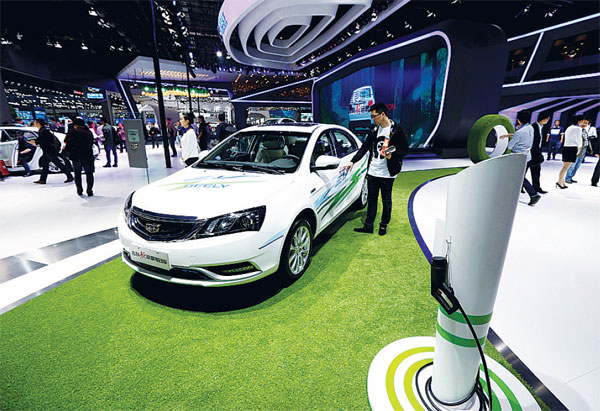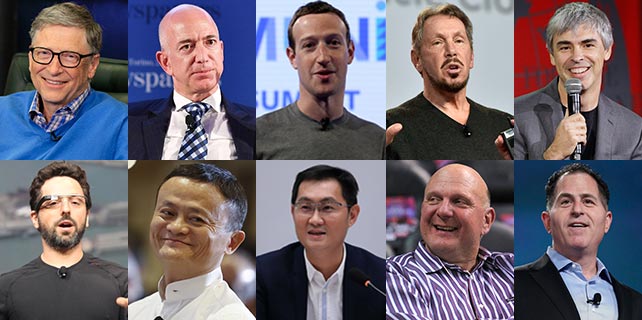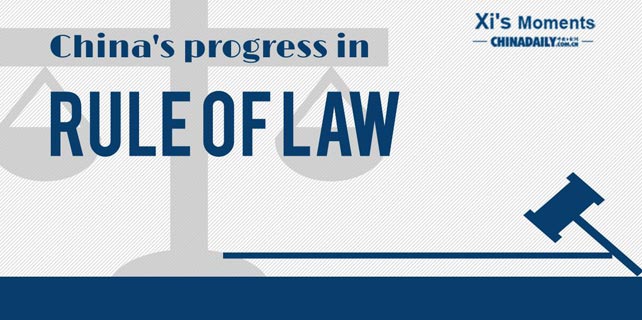Geely's EV goal picks up speed
 |
|
The Emgrand electric car, produced by Geely, featured at an auto show in Shanghai. The Emgrand has been widely praised by electric-car enthusiasts. PROVIDED TO CHINA DAILY |
China's Geely has been the quiet achiever in the electric vehicle (EV) market.
While building domestic market share in the EV segment, the automaker, headquartered in Hangzhou, East China's Zhejiang province, has also been making inroads globally.
Back in 2012, Geely bought the financially strapped London Taxi Company — manufacturer of the English capital's iconic black cabs. That company was recently relaunched as the London Electric Vehicle Co.
But it was Geely's 2010 purchase of renowned Swedish carmaker Volvo that put it firmly on the global automotive map. Their successful pairing has just pulled off quite a coup. With Volvo's announcement in July that all of its cars produced from 2019 will be electric — or at the very least hybrid — Geely has upped the ante in the EV stakes.
The question now is whether Geely's all-electric initiative with the iconic Swedish brand will enable it to leapfrog rival European automakers as momentum for electric cars continues to build. At the very least, it paves the way to making internal-combustion-engine Volvos a thing of the past.
Even so, there are concerns the switch by Volvo Cars to electric-hybrid vehicles by 2019 may be coming too early, before there are sufficient battery-charging stations. However, the two carmakers are confident the time is right.
"This is about the customer," said Hakan Samuelsson, president and CEO of Volvo Cars, in a company statement. "People increasingly demand electrified cars and we want to respond to our customers' current and future needs."
This planned collaboration with Geely will strengthen Volvo's ability to develop next-generation electrified cars, Samuelsson said.
According to Jose Pontes from website EV Obsession, it is not "folly" to go all-electric now, but rather, it is "where the market is going".
He told China Daily: "So the question is not if, but when — and the prize of taking the chance of being a pioneer is having the better part of the market. Because Volvo has taken the chance of electrifying its lineup, it makes sense to create scale and expand it through the other brands, including the Geely brand."
In partnership with Geely, Volvo Cars will unveil a range of electric car models, including fully electric cars and plug-in hybrids. In all, Volvo will launch five fully electric vehicles between 2019 and 2021.
"The Geely group is looking more and more like the Volkswagen Group, with several brands in different segments of the market, so it would make sense to copy the VW tech-expansion strategy into the Geely group," said Pontes.
He said that Geely can start by launching state-of-the-art technology in its premium brands — Volvo and Lotus — and then spread it "a couple of years later into the lesser brands". He added that this creates scale and makes the technology cheaper to build.
Geely announced in May that it was acquiring a controlling stake in Lotus, a British maker of sports cars, from Malaysian automaker Proton.
The Geely-Volvo EV move will be run out of China with a subsidiary at Volvo's base in Gothenburg, Sweden.
Li Shufu, founder and chairman of Geely, said in a statement: "We will unlock significant benefits across our portfolio by sharing both technologies and next-generation vehicle architectures."
Volvo's Samuelsson said that the announcement marks the end of the solely combustion engine-powered car. "Volvo Cars has stated that it plans to have sold a total of 1 million electrified cars by 2025. When we said it, we meant it. This is how we are going to do it," he said.
Industry consensus suggests the timing of the ambitious EV initiative appears to be right.
"I think Volvo and Geely's recent announcement was a bold statement and has captured the global tone of where we now are with electric vehicles," said Simon Moores, managing director of Benchmark Mineral Intelligence, an online publishing and consultancy business.
"Automakers that are smaller in size have to take drastic action in the face of electrification . Those caught in the middle-sized companies producing mid-price vehicles — risk going out of business. Volvo sees this and has acted first. That's sensible as the industry is only heading in one direction — electric," he said.
Geely has been establishing its credentials slowly but surely in China's EV market.
Chinese automotive heavyweights BYD and BAIC have garnered significant attention with their electric car offerings, notably the e6 and EU260 models respectively.
But Geely has also performed respectably in this space.
Fred Lambert, editor-in-chief at EV website Electrek, described Geely's Emgrand EV as "probably the most polished all-electric vehicle in the Chinese EV segment".
"The decent sales performance should encourage Geely to move forward with its EV programs, and the company's work with Volvo to develop a new EV platform architecture will serve as the base for those vehicle programs," he said.
Geely delivered 12,000 Emgrand units in 2016, Lambert added.
EV Obsession's Ponte named Lynk & Co as the real gem in Geely's stable. The automotive brand was launched last year and is a subsidiary of Geely.
"On top of a brilliant branding strategy, placing (Lynk & Co) as an irreverent and 'young' make, the Volvo-technology-assurance stamp of quality could make people look at it more as Volvo's younger, hipper sister, rather than as just another Chinese brand.
"Even in Western markets, where Volvo is in need of a cheaper brand to help it win scale, Lynk & Co has a real chance of success, because of the Volvo connection, which would be reinforced if the European units were made alongside the Volvo ones, in Europe," Ponte said.
But Geely is also keeping its eye on the prize at home.
Electrek reported that in 2016 alone, China doubled its fleet of electric cars to over 600,000, more than the US and all of Europe combined.
"Plug-in hybrids are still dominating the Chinese electric car market. But China's EV market is different for its variety of EV models available. Over 60 models are available, 13 of which sold over 10,000 units in 2016," said Electrek's Lambert.
Generous government EV subsidies — up to 100,000 yuan ($15,000) for plug-in hybrid and all-electric cars — have undoubtedly helped drive the EV market. But with a 20 percent cut in green vehicle subsidies this year, competitors in the industry must stay on their toes to ensure they cash in on the acceleration of EV ownership.
With the Chinese government poised to allow foreign EV companies to manufacture in China without being part of a joint venture, the competition is expected to hot up further.
But Geely is well placed to secure its share of the EV market as it continues to pursue its electric car interests — both locally and globally through its partnership with Volvo.
Interestingly, the presence of international EVs could actually be a boost to Chinese electric automakers.
Tesla, based in California's Silicon Valley and listed on New York's Nasdaq stock exchange, has plans for localized production in China. It is the highest-valued carmaker in the United States with a market capitalization of more than $60 billion.
"I think the market is going to be so big that competition like Tesla helps the overall push to EVs. Tesla's popularity and availability in China will help all domestic EV manufacturers," said Moores of Benchmark Mineral Intelligence.









